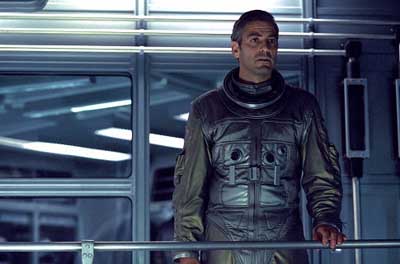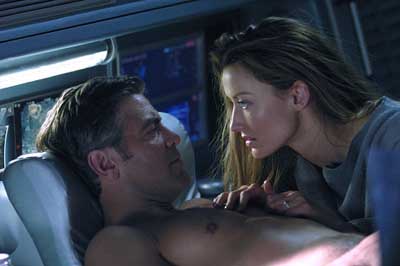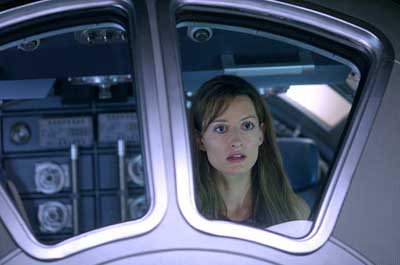Solaris
Abstract remake of an abstract original beloved of abstract arty-types begs to be given a chance.

Solaris hasn't done particularly well on it's home turf, primarily because if you present an average American with something even vaguely intelligent or thought provoking they'll run away crying and demand to polish their gun collection. Like Contact, this is a movie that does not set out to dazzle and excite, or even provide an answer to what's happening. What it does do, however, is promote a little thought and exploration. Should it be punished for this? No. Should it be punished for erring a little on the side of pretentiousness? Mmmmmmmaybe.
For those unfamiliar (myself included), Solaris is a remake of Andrei Tarkovsky's 1972 original. Originally conceived as a socialist response to Kubrick's 2001: A Space Odyssey, it's not particularly well regarded as a classic by many critics, and so seems an odd choice for one Mr. Steven Soderbergh to pick up and run with. He and Mr. Clooney obviously saw something they liked, but whether or not audiences outside the US will feel the same or share the apathy of their Stateside cousins remains a mystery. The story revolves around a space station orbiting the planet Solaris; a strikingly beautiful ball of gaseous blues and pinks. The residents of this station seem to be offing themselves and each other under mysterious circumstances, and one of the remaining inhabitants, Dr. Gibarian (Ulrich Tukur), calls his old friend Dr. Chris Kelvin (Clooney) to investigate.
Kelvin is something of a wreck, still haunted by the suicide of his wife some years previously. Presumably since he has nothing better to do, he decides to take up the offer, even though a previous rescue team has never been heard of since they went silent moments before docking with the station. When he gets there, he finds Gibarian dead, apparently a suicide, and only two other members of the team alive; the clearly disturbed Snow (Jeremy Davies), and the clearly-on-the-brink-of-disturbed Helen Gordon (Viola Davis). They rather cryptically refuse to explain what it is they think is happening, telling Kelvin that he'll understand soon enough.

Soon enough it is, as that night Kelvin is visited by what appears to be his wife Rheya (Natascha McElhone). Understandably perturbed, he tricks her into entering a capsule and launches her into space, which seems fair enough at the time. He is soon revisited, however, by another incarnation of Rheya, and this time begins to have difficulty in accepting that the person he sees is indeed not his wife. It transpires that the others onboard have all suffered a similar fate; being visited by an embodiment of a person close to them but deceased. Snow claims his brother visits him, Gordon refuses to reveal the nature of her visitor, and the son of Gibarian still inhabits the station, appearing fleetingly every so often. It's all very odd indeed, and as the crew search for answers, and more importantly a solution to their predicament, they find themselves questioning both their sanity and the moral implications of abandoning their visitors.
From a technical standpoint, Solaris is absolutely beautiful. Soderbergh employs his trademark mixing of visual styles for each environment to good effect. Kelvin's flashbacks to his relationship with Rheya on Earth are all warm hues and shifting focus, whilst the space segments contrast the somewhat clich?d cold blue interiors with the swirling beauty of the planet outside. It's worth noting whilst on the subject of visual splendour that Soderbergh and Clooney's usual choice of "that woman Roberts" has here been mercifully replaced with the stunning McElhone, who plays her part superbly and infinitely less annoyingly than our old chum Julia could ever have hoped.
The performances in general are great, with McElhone measuring the amount of distance between human and inhuman superbly, especially given her character's detached middle-distance stare. Clooney drops the smirk and self-assured posturing to deliver one of his better turns, reminding us that his leading man credentials can actually rest on presence as well as annoyingly well-chiselled looks. Davis is marginally above functional, but then her screen time is limited. It's Jeremy Davies who is the standout here, though. His performance is wonderfully neurotic and suitably off-world, but never degenerates into comedy Loony Tunes territory. As a man isolated and disturbed he really is second to none, and is easily one of the picture's biggest assets.

Also worthy of mention is the splendid sound design and the limited but brilliantly functional sets. The movie presents one of the most convincing scenarios of middle-future existence I've seen, tempering the traditional sci-fi tendency for outlandish gadgetry and clothes design for altogether more contemporary themes, albeit with enough of an edge to seem suitably alien. Where I do have issues with the film is in it's general conception and plot direction. Like it's predecessor, it suffers from being just a little too pretentious. The nature of love and human memory are fairly big themes to be dealing with, and here they are treated in such an outlandish context that it's nigh on impossible not to feel distanced from the material. As such it's intrinsically taxing to care much about what's going on or who it's going on with. Clooney's journey into space as a metaphor for his journey into his own self is cool, but basically silly. As much sympathy as one can feel for his character, the scenario renders viewers largely apathetic towards his outcome.
As such, despite it's relatively short sub-100 minute running time, many viewers will find themselves struggling to focus. Our very own Rhythmwiz desperately commented something along the lines of "when will this tedium end?". Unfortunately for him we were only about ten minutes into the picture. Poor lad, but he probably wont be alone in his views. This reviewer for one really quite enjoyed Solaris, but I have to be honest and say I can't claim to be able to quantify exactly why. It is it's own worst enemy in a sense, because it takes a fairly intriguing concept and distorts it unnecessarily purely to be true to the original, rather than making it more accessible which it need not have sacrificed artistic quality to achieve.
Approach Solaris with an open mind and an eye for the aesthetic, and you might just come away pleasantly surprised; I certainly did, expecting a lot worse before entering the screening than I actually left with. Perhaps with a little more grounding in the firm rather than the existential it could have achieved greater acclaim, but as it is, Solaris must remain an alluring obscurity rendered real primarily as an interest for those involved in it's production rather than it's viewing. It's a bit like Kylie's ass; absolutely beautiful to look at, but ultimately full of shit.
Ever the fair of judgement, Disko is awarding Solaris 3 out of 5 Happy Units. Such is life.
Natascha McElhone (Rheya Kelvin)
Jeremy Davies (Snow)